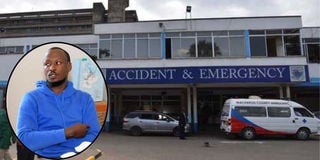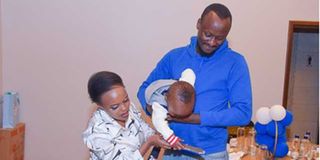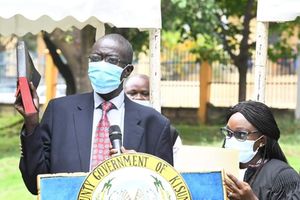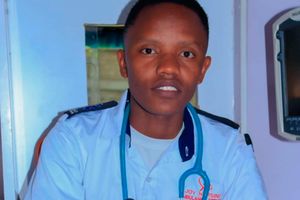
The entrance to the Kenyatta National Hospital’s Accident and Emergency Unit. (Inset) Dr Timothy Riungu.
On the night of November 22, a fatigued Dr Timothy Riungu (35), a paediatrician at Kenyatta National Hospital (KNH), returned to his apartment at Upper Hill and sat on his couch to rest.
For nearly a month, Dr Riungu, a surgical registrar in the department of surgery at KNH, had been on duty round-the-clock, a gruelling routine that had taken a toll on him.
Besides working for long hours, Dr Riungu had not taken leave for the two years he had been working at the facility as a Master’s student under a University of Nairobi programme.
This long stretch without a break was an extension from another two-year stint at Meru where he was stationed, before relocating to Nairobi for the academic programme.
Due to this exhausting schedule, Dr Riungu, who was also diabetic, had fainted at the hospital on numerous occasions, according to his colleagues and seniors.
His wife, Victoria Njoki, also disclosed due to this punishing routine, the last time she had been with her husband was August 1, when the mother of their three-year-old boy travelled from Meru to visit him.
Against this backdrop, it was inevitable that on the fateful Friday night, he had collapsed in a heap on the couch in his apartment off Matumbato Road, at Upper Hill.
The apartment he shared with his roommate, who was away at the time, was in darkness because the pre-paid power unit had run out of tokens.
Nobody heard from Dr Riungu throughout the weekend. He was also not reachable through his mobile phone. It was not until around 11pm on Sunday, November 24, when his roommate returned to find their house in darkness. When he switched on the lights after topping up the pre-paid power unit, he was surprised to find his friend lying on the couch. He was dead!
“He had a blood-stained fluid oozing from his mouth and nostrils,” noted an official report by the Kilimani Directorate of Criminal Investigations.
A postmortem revealed Dr Riungu died of hypoglycemia also known as low blood sugar, which occurs when the blood sugar level of a person drops below normal.
The autopsy also revealed that for more than 48 hours prior to his death, Dr Riungu had not eaten anything, specifically carbohydrates, needed because of his medical condition.
Toxicology tests
There was no trace of any food in his system with the large and small intestines as well as rectum (the lower part of the large intestine that stores stool) visibly shrunk. According to pathologists at Montezuma Funeral Home, the ‘food content’ in Dr Riungu’s digestive was so little that it was impossible for them to get an adequate sample for toxicology tests.
“As a result of my examination, I formed the opinion that the cause of death was due to hypoglycemia,” concluded Dr Michieka Michieka, the pathologist who examined the body.
Dr Riungu was an employee of Meru Level 5 Hospital who was at KNH for a UoN’s Master’s programme.

Last Sunday evening , Dr Timothy Riungu (35) a practicing pediatric surgeon who also doubled up as a surgical registrar in the department of surgery at Kenyatta National Hospital (KNH) left the region's biggest referral hospital after the usual 7-day 24 hour calls,went home and died on his couch. With him are his wife Victoria Njoki and their son.
“He was struggling with delayed payment from the county. This is a huge loss not only to us as a family but the country. Shame on all those in authority, now that he is dead he won’t help Kenyan patients. A very big loss,” said Dr Riungu’s eldest brother.
Dr Riungu’s supervisor, Dr Peter Mwika, a pediatric surgeon and lecturer at UoN, suggested Dr Riungu was too broke to afford a meal.
“I spoke to his roommate, he told me they did not have electricity tokens and so when he bought them... it is when he noticed that Dr Riungu was dead on their couch,” Dr Mwika said.
Dr Riungu’s colleagues, fellow medical students, told Nation of their suffering at KNH, where they are constantly threatened by their seniors that they would be frustrated to not finish their training or obtain a licence to practice if they didn’t toe the line.
A colleague who first met Dr Riungu as a third-year medical student in 2014 and in 2021 as classmates in their first year as surgery registrars, said he wanted to be a pediatric surgeon but had been let down by a harsh system.
“My experience rotating in paediatric surgery as an undergraduate medical student was horrific. I had anxiety attacks that whole month and the terror I experienced still haunts me to date,” recounted the medical student at UoN currently training at KNH.
Nation has established that this cruel, donkey-work treatment of intern doctors is some sort of ‘rite of passage’ and an open secret in the medical field, whose perpetrators, senior medics, wear as a badge of honour.
On Saturday, Dr David Kihiko, the thematic head of pediatric surgery at UoN, told Nation the rigid gruelling system is necessary.
“Dr Riungu was a very gifted and promising surgeon who never complained about the work environment at KNH. This has always been the culture of doing things...He was always smiling. The medical residents who have spoken to you just love complaining,” Dr Kihiko told Nation.
He explained it was not the duty of UoN to provide food to medical student residents training at KNH as per their partnership.
“Our students actually offer free services to KNH which charges patients for the services they offer and pocket the money. Let’s say if the cost of surgery is Sh 100,000, KNH takes all the money and does not even have a stipend for them that they can perhaps use to buy food,” Dr Kihiko pointed out.
Diabetes
“I did not know that Dr Riungu was living with diabetes and the role of scheduling the rota, which indicates how the medical students at the surgery department are going to work is usually left to the ‘chief resident’ who is more like a head boy and is elected from among the medical residents,” Dr Kihiko explained while responding to concerns that medical students at KNH are overworked.
“Last Friday, Dr Riungu, being the senior, was on a call with three other junior trainees, who honestly know nothing which means one person did the work of four people. This is why we have been telling them the scheduling is wrong but they don’t listen because if you put it that way, what time do you think Dr Riungu will ever leave the theatre to rest or even have a meal?” said Dr Riungu’s colleague.
“Ideally, the chief resident is supposed to be the liaison between the registrars and the consultants. However, most have become like "colonial home guards" who use the powers given to them to harass and torture their fellow residents,” the trainee doctor complained.
According to the junior doctors, Dr Mwika, a pediatric surgeon and lecturer at UoN and KNH, is ruthless.
“He's the one responsible for coordinating the residents, he’s one of the early trainers of the programme and confidently says how he must beat the residents to shape,” the trainee doctor said.
Dr Mwika responded: “I know how the pediatric surgery training programme feels, it’s very intense. We borrowed it from the United Kingdom. When you come in, there are hours you are expected to meet.”
“The hours they have to work do not allow them to have enough rest, in the UK and India it is worse. I was mentoring Dr Riungu, and yes he fainted while at work due to fatigue before his unfortunate demise,” Dr Mwika told Nation.
He however clarified that he did not know Dr Riungu was diabetic.
“There is fatigue and lots of it because as pediatric surgeons, we have six hours at most to save the lives of babies. We cannot afford to waste time, that’s the reality of the job. We are only two supervisors with the 13 doing all this work and we love our students,” Dr Mwika told Nation.
“My own son went for surgery at MP Shah at 3am but I still left him in HDU to come to work. That’s how much I love my students,” Dr Mwika said.
“I operate on Tuesdays and I always ensure there is pizza and coffee in the theatre.”
Dr Riungu’s best friend and colleague noted that when his dreaded three-month rotation in paediatric surgery finally came, he almost died.
“I was lucky to survive, I was subjected to seven-day 24-hour calls. When on call, I was on duty from Monday to Sunday, both day and night; with no support. No breaks, no close living quarters were provided, no meals or refreshments – just brutal work that never ends in KNH,” the medic told Nation on Saturday.
“I raised concerns severally to the consultants, but I was dressed down for being “weak” and not having the “stamina” to work in that department.
I viewed my time there as a prison sentence, and literally counted down the days,” he said.
Regular breaks
“Everyone else gets breaks and works humane hours except the registrar, we nurses work in shifts with regular breaks, the consultants similarly are barely stretched but the registrar is the donkey; worked to the bone and if something goes wrong, he or she is always a convenient scapegoat,” said a female nurse at KNH who knew Dr Riungu.
The nurse further disclosed that in her view, KNH does not consider registrars part of the staff, yet they do most of the work.
Speaking to Nation, Dr Joel Lesan who was tasked to officially respond on behalf of KNH by management, said they will soon hold a meeting with all the doctor trainees who worked with Dr Riungu and provide counselling.
“What has happened is unfortunate, we provide some food and would never wish for any of our own medics to go hungry,” Dr Lesan said.
Dr Mwika added: “There is no way we are going to change the programme, instead, we will develop a mental health programme for those training here, we can’t change the working hours because we cannot afford to produce half-baked doctors.”
Kenya Medical Practitioners Pharmacist & Dentist Union (KMPDU) deputy secretary general Dennis Miskellah said what happened was unfortunate.
“As a union, we regret what happened to our colleague. He was an astute unionist. Polite and he rarely complained,” Dr added.
“What befell him is not strange to the profession: long working hours without rest, without meals because our workplaces have become death traps from too much toxicity. As a union, we pushed during our strike for a Return to work formula that was clear that registrars work for only 40 hours but the KNH and UoN management rejected that proposal,” he said.
“Having witnessed how those who disclosed their medical conditions were treated by the paediatric surgery department, he silently bore his burdens,” another medical student who worked with Dr Riungu told Nation adding that while in theatre, it is frowned upon to have meals – which is an absurdity because everyone else in the operating team would take breaks and refresh, except the registrar.
“The registrar in paediatric surgery is expected to operate from morning till evening without having to take a meal – apparently that is the mark of a “resilient” surgeon. Tim is no longer with us. He passed away alone in his house after being worked for three continuous weeks with no breaks,” he said.
“Dr Joel Lesan, who is our handler here, made rounds on Friday and bombarded Dr Riungu with work despite him continuously complaining of exhaustion.









